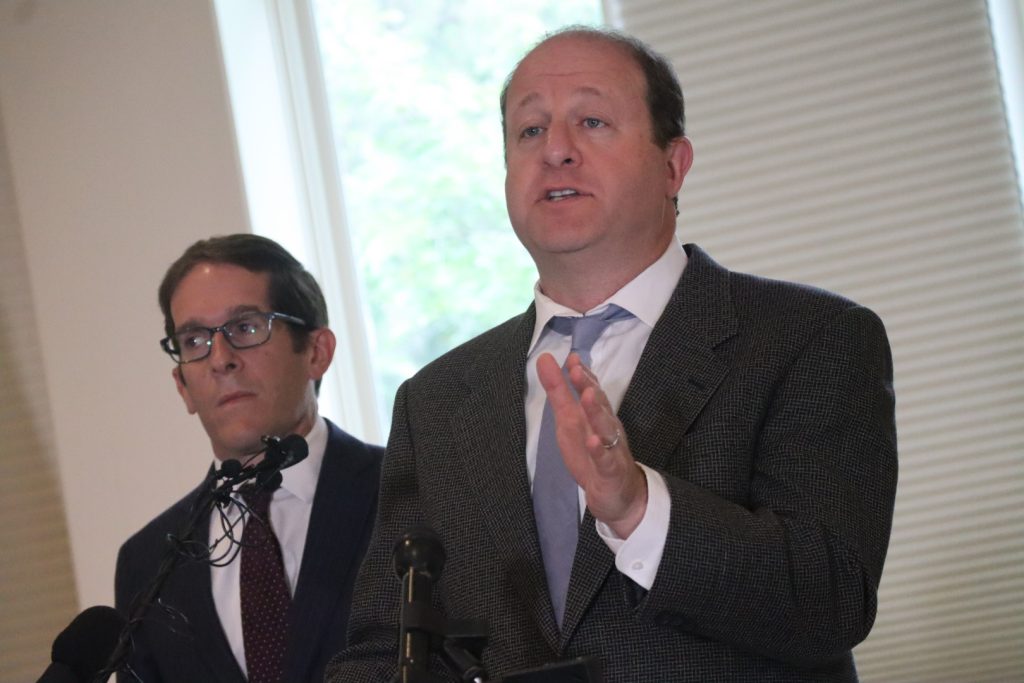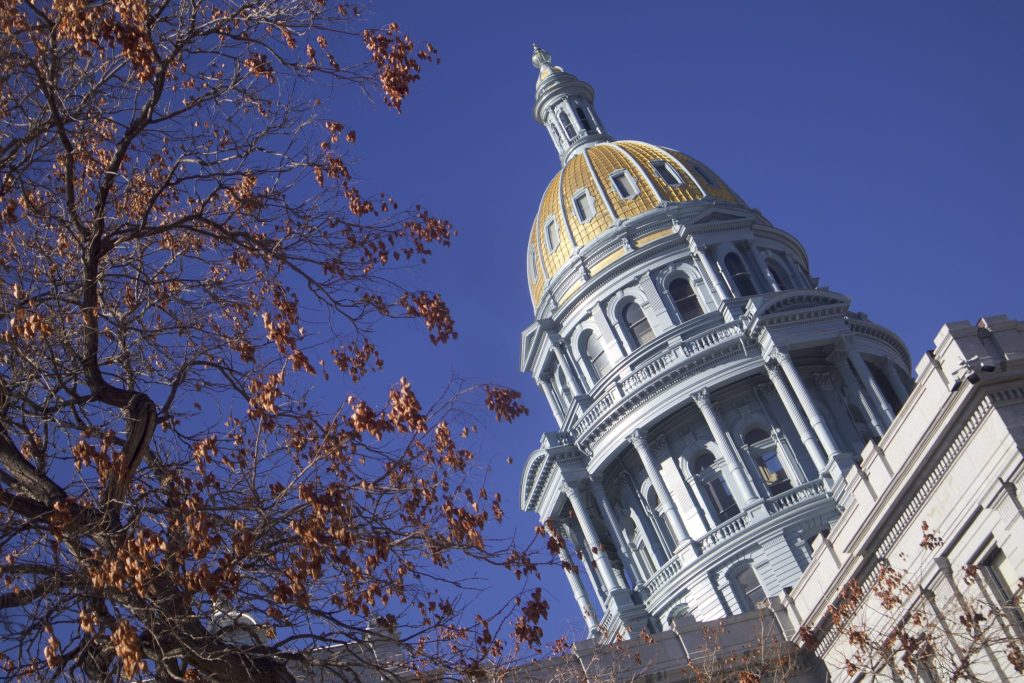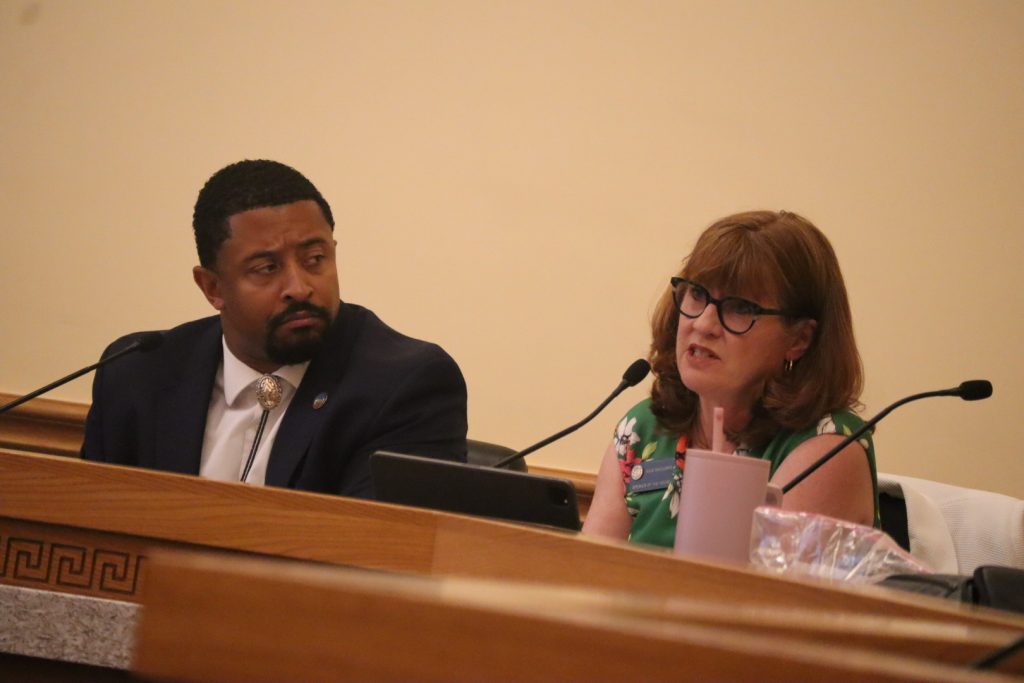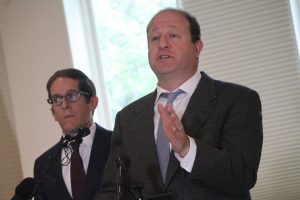Colorado Gov. Jared Polis calls legislature back for special session to deal with budget fallout of GOP tax law
Priorities will include closing tax loopholes, protecting funding for health insurance subsidies and SNAP

Robert Tann/Summit Daily News
Gov. Jared Polis is calling Colorado lawmakers back to the state Capitol this month for a special session to address the budget fallout from congressional Republicans’ federal tax law.
Polis made the announcement on Wednesday, and the special session is set to begin at 10 a.m. on Aug. 21.
Lawmakers’ main task will be closing a major deficit in this fiscal year’s state budget, which is being driven largely by changes to the corporate tax code. Analysts for the governor’s office project that the extension and expansion of corporate tax cuts passed by Congress will cost Colorado $1.2 billion in revenue for the 2025-26 fiscal year.
After accounting for revenue that exceeds the cap set under the Taxpayer’s Bill of Rights, that leaves the state’s general fund with a more than $780 million funding shortfall for this year. The governor’s office had previously believed the deficit was higher at around $950 million, but later revised its numbers.
Polis said dealing with the budget gap is an urgent need that can’t wait until next year’s regular legislative session, which begins in January. That’s because the clock is already ticking on the current fiscal year’s budget, which went into effect in July. Colorado, unlike some other states, closely mirrors federal tax law, meaning changes that went into effect this year have an immediate impact on the state.
“Today, we have 11 months remaining in the budget year,” Polis told reporters on Wednesday, “and that’s very important. That means that cuts, while difficult, can be spread over a longer period of time.”
Polis also issued a hiring freeze for all state employees that will begin on Aug. 22 and last through the end of the year, something he estimates will save the state $3 million to $7 million.
“We know that we in Colorado have to balance our budget, and we’re ready to roll up our sleeves and get it done,” Polis said.
During the special session, lawmakers will be asked to find ways to reduce state spending while boosting revenue.
Tax revenue generation ideas could include closing existing tax loopholes for businesses and decoupling the state from certain federal tax provisions. Lawmakers may also need to dip into the state’s reserves, which currently sit at around $2.3 billion — equal to 15% of the state’s general fund — to help close the budget shortfall.

Health insurance and SNAP are also on the table
Other priorities for the special session will be protecting certain programs and services, like health care subsidies and food assistance, that are being cut as a result of the federal tax law.
Polis called on lawmakers to address an expected surge in health insurance premiums after Congress didn’t renew enhanced federal subsidies that were passed under the Biden administration.
The subsidies, set to lapse at the end of 2025, lowered premiums for people who receive health insurance plans through Affordable Care Act marketplaces, like Connect for Health Colorado, which had around 300,000 enrollees at the start of this year.
Colorado Insurance Commissioner Mike Conway previously told legislative leaders that the expiration of subsidies will lead to an average statewide insurance premium increase of 28% for Connect for Health Colorado plans next year. That’s based on preliminary rate increases requested by insurers.
Cost increases will be highest on the Western Slope, where the average plan could jump by 38%, according to Conway.
The special session also provides an opportunity to get ahead of impending cuts to the Supplemental Nutrition Assistance Program, which is set to lose $186 billion over the next decade due to the federal tax law.
The legislature will likely try to amend the language of two ballot measures that it had already referred to voters for the upcoming November election.
The measures will ask voters to bolster funding for the state’s Healthy School Meals for All program, which provides free breakfast and lunch for school children, by allowing the state to further limit income tax reductions and keep more of the money.
Lawmakers could revise the language to allow for that funding to also support the state’s SNAP program. Federal SNAP cuts are set to go into effect at the start of 2027.
Another federal policy change that essentially bars Planned Parenthood from receiving matching federal Medicaid funds could also be addressed during the special session. Polis said lawmakers should look at ways to ensure Coloradans can receive Planned Parenthood services under state Medicaid reimbursements.
Lawmakers to take another swing at AI bill
Unrelated to the federal law, the special session will also include another crack at revising Colorado’s first-in-the-nation artificial intelligence law.
The measure, passed last year and set to take effect on Feb. 1, 2026, seeks to prevent discrimination in areas like employment, education and health care that may result from AI-driven algorithms. It also places new transparency requirements on AI developers as well as companies and organizations that use those systems in their decision-making.
While proponents of the law say it will protect consumers, technology companies and business groups that use AI have raised concerns over placing an undue burden on the business community and stifling innovation in the state.
Polis had pushed for changes to the law this past session, but lawmakers failed to make any revisions. Polis said lawmakers could look at a range of solutions during a special session, including changes to the law itself or a delay in its implementation timeline.
“We want to make sure that this is settled sooner rather than later,” he said.

Democrats, Republicans react
Colorado Democrats have continued to lay the blame for the state’s budget situation and need for a special session squarely at the feet of congressional Republicans and President Donald Trump, who pushed for the tax law to deliver much of his second-term agenda.
Colorado House Speaker Julie McCluskie, D-Dillon, said in a statement on Wednesday that lawmakers were left with “no choice but to convene for a special legislative session to address the crisis the GOP has created.”
“All Coloradans are now the collateral damage from the GOP’s cruel bill, which will jeopardize services for hardworking families, children, veterans and older Coloradans,” McCluskie said. “We’ll work hard to minimize the fallout on our communities, but that requires us to act now to mitigate the harm this bill has caused our state.”
Democrats who serve on the legislature’s Joint Budget Committee, a bipartisan group that drafts each year’s spending plan, said the federal tax law will compound an already challenging budget situation. Committee members this past legislative session already had to close a $1.2 billion shortfall, which they blamed on revenue constraints due to TABOR.
“On July 1, we had a balanced budget, and on July 4, we were down a billion,” said Sen. Jeff Bridges, D-Greenwood Village, the Joint Budget Committee chair. “First, we cut $1.2 billion because of TABOR. Now, we’re cutting $1.2 billion because of Trump.”
State Republicans, however, have blasted the special session as “political theater.” They say the budget issues are the result of years of unsustainable state spending.
House Minority Leader Rose Pugliese, R-Colorado Springs, said in a statement that the pending session “is a waste of taxpayer dollars and state resources.” Pugliese accused Polis of stirring fear over the federal tax bill and its impacts on health care.
Republicans have continued to defend the law’s impact on services like Medicaid, which they say is being protected by weeding out waste, fraud and abuse and limiting eligibility for those who truly need it.
The Congressional Budget Office estimates the law will cut Medicaid funding by $1 trillion by 2034 as a result of new work requirements, eligibility restrictions and cost shifts to states. Pugliese said congressional Republicans’ law “continues to cover the people it was designed to serve: seniors, single mothers, children, and people with disabilities.”
Outside of coverage for Planned Parenthood, the August special session is not expected to deal with the Medicaid cuts, which aren’t set to go into effect until 2027. This means lawmakers will have time next year to respond.
It takes a minimum of three days to pass a bill in Colorado, meaning the special session will last at least that long. This will be the third consecutive special session in two years after Polis called lawmakers back in 2024 and 2023 to pass property tax relief measures.

Support Local Journalism

Support Local Journalism
Readers around Glenwood Springs and Garfield County make the Post Independent’s work possible. Your financial contribution supports our efforts to deliver quality, locally relevant journalism.
Now more than ever, your support is critical to help us keep our community informed about the evolving coronavirus pandemic and the impact it is having locally. Every contribution, however large or small, will make a difference.
Each donation will be used exclusively for the development and creation of increased news coverage.










